(完整版)情态动词归纳表格
情态动词解析归纳表

①此时可用be able to代替。 ②Can只有一般现在时和一般 I’ll not be able to come this 过去式;而be able to则有更 afternoon。(更多的时态) 多的时态。 He was able to go to the party ③当表示“经过努力才得以做 yesterday evening in spite of the heavy rain. (经过努力才得以做成功某) 成功某事”时应用be able to,不能用Can。was/were able to to表示成功做了某事 Yes, you can. 在请求允许的用法中,could No, you can’t. 并不是过去 时,它指的都是 Yes, you can. ( No, I’m afraid not. ) 将来时,虽然请求用could 语 Yes, of course you can.(肯定回答句 气委婉,也允许不用 could. 中,不能用 could )
may
might ②表示推测、可能性(不用于 He may /might be very busy now.
疑问句)。 ③用于祈使句,表示祝愿。 ① 表示必须、必要;说话人 “不许”和“禁止”某人做某 事,有很强的劝告语气。 ② must是说话人的主观看 法, 而have to则强调客观需 Your mother may /might not know the truth. May you succeed! You must come in time. Must we hand in our exercise books today?
can
②表示请求和允许,用could Can I go now? could 要比用can更加迟疑不决,当 Could I come to see you tomorrow? 你没有把握 得到允许时,这 Could I give you dinner one of these days? 样更婉转。 ③表示客观可能性 They’ve changed the timetable, so we can go by bus instead. This hall can hold 500 people at least.
初中英语8种时态及情态动词的被动语态 总结表格版
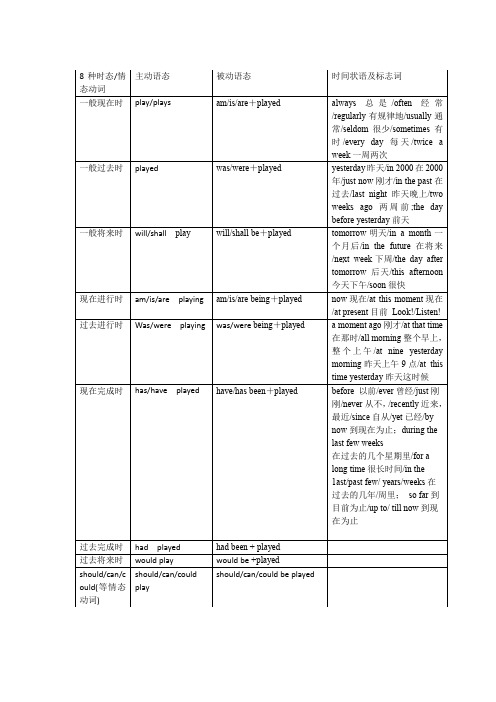
tomorrow明天/in a month一个月后/in the future在将来/next week下周/the day after tomorrow后天/this afternoon今天下午/soon很快
现在进行时
am/is/are playing
am/is/are being+played
一般现在时plຫໍສະໝຸດ y/playsam/is/are+played
always总是/often经常/regularly有规律地/usually通常/seldom很少/sometimes有时/every day每天/twice a week一周两次
一般过去时
played
was/were+played
yesterday昨天/in 2000在2000年/just now刚才/in the past在过去/last night昨天晚上/two weeks ago两周前;the day before yesterday前天
should/can/could(等情态动词)
should/can/could play
should/can/could be played
时态解题步骤
看时间标志词确定时态看主语与动词关系确定语态看人称确定单复数
现在完成时
has/have played
have/has been+played
before以前/ever曾经/just刚刚/never从不,/recently近来,最近/since自从/yet已经/by now到现在为止;during the last few weeks
在过去的几个星期里/for a long time很长时间/in the 1ast/past few/years/weeks在过去的几年/周里;so far到目前为止/up to/ till now到现在为止
情态动词总结表格

Can you speak English?
You can go now.
Can/Could I use your phone please?
He can’t be our teacher.
He has gone toBeijing.
may/might
表示请求、许可,译为“可以”相当于can
表示推测,译为“可能,也许”
Will/Would let me use your phone please?
确定性的程度
might<may<could<can<would<will<must
1在表示推测中,can’t 译为“不可能”,may not 译为“可能不”。can’t比may not语气更强。
2can表推测常用语否定和疑问句中。may常用于肯定句中。
3could、might、would等情态动词不表示过去,而表示一种委婉语气。
may/might+V原型
例句
I must/have to leave now.
He must be mad.
can/could
1表示“能够、允许”
2表示请求
can’t表推测译为“不可能”常用于否定句中。
can 表示推测时常用于否定句或疑问句中。译为“不可能;”肯定推测用must “一定”或may“也许”。
can’t+V原型
May/MightIuse your phone please?
Hemay/might telephoned last night,butI’m not sure.
will/would
表示意愿
表示请求
在表示请求时,would比will更委婉。
例句
情态动词用法表格
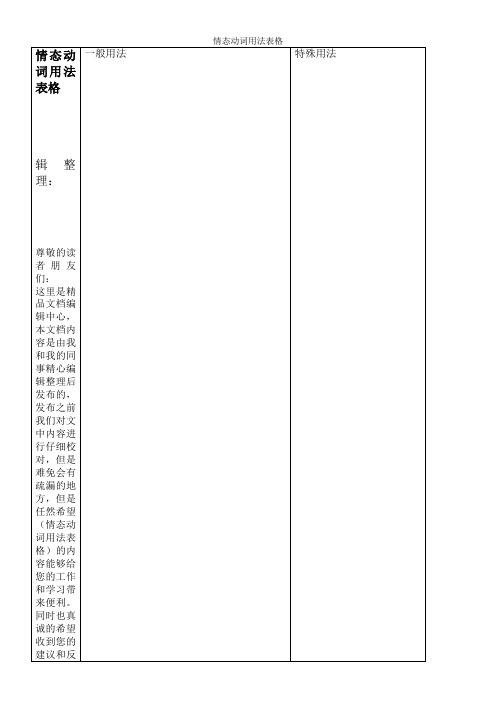
馈,这将是我们进步的源泉,前进的动力。
本文可编辑可修改,如果觉得对您有帮助请收藏以便随时查阅,最后祝您生活愉快业绩进步,以下为情态动词用法表格的全部内容。
can 1. 可以能够(表体力或脑力的能力)2. 可能(表示猜测,用于疑问句和否定句)3。
可以(表请求)理论上的可能性Could 1.可以能够2.可能(表示猜测,用于疑问句和否定句)3.可以(表示请求,比can委婉)May 1.可以(表示请求,比can正式)2.也许,可能(表示猜测)表示祝福住院Might 1.可以(表示允许,比may客气)2.也许,可能(表示猜测,比may可能性小)Will 1.将要(表示将来)2.表示意愿,决心3.表示自然规律4.表示倾向性动作5。
可以(表示请求或征求意见用于疑问句第二人称)would过去常常(表示过去的习惯性动作)可以(表示请求或征求意见,语气比will委婉)Shall 1.将要(用于第一人称=will)2.表示征求意见或许可(用于一,三人称)1。
表示允许,警告,命令,威胁(用于二,三人称)Must should may mightCan’t /could’t 不可能can 表示客观可能性—-— Can I sit here?-—- Yes, you can.———No, you can’t/mustn't。
以could或would提问时,不能再以could或would作答,而应该用can。
如:— Could I borrow your dictionary?— Yes, of course you can.—-- No, I'm afraid not.—-— May I use your pen?--- Yes, you may。
———-No, you may not。
/mustn’t。
/can't。
/had better not.-—— Must i finish my job at seven?—-— Yes, you must.———No, you needn't. / No, you don't have to。
情态动词的用法总结表格

情态动词的用法总结表格|情态动词|用法|例句||||||can|表示能力,“能,会”|I can swim 我会游泳。
|||表示许可,“可以”|You can go now 你现在可以走了。
|||表示可能性,“可能”|It can be very cold in winter 冬天可能会很冷。
||could|can 的过去式,表示过去的能力|I could ride a bike when I was five 我五岁时就能骑自行车。
|||could 可用于委婉地提出请求、建议等|Could you please help me? 您能帮我一下吗?||may|表示许可或请求许可,“可以”|May I come in? 我可以进来吗?|||表示可能性,“也许,可能”|It may rain tomorrow 明天可能下雨。
||might|may 的过去式|He said that he might come 他说他可能来。
|||用于可能性较小的推测|She might be at home 她也许在家。
||must|表示必须,强调主观上的“必须”|You must finish your homework 你必须完成作业。
|||表示肯定的推测,“一定”|He must be very tired 他一定很累了。
||have to|表示客观上的“不得不”|I have to go now 我现在得走了。
|||有人称、数和时态的变化|She has to do a lot of housework 她不得不做很多家务。
||should|表示应该,常用来提出建议|You should study hard 你应该努力学习。
|||表示推测,“应该”|They should be there by now 他们现在应该到那儿了。
||ought to|同 should ,表示应该|You ought to listen to your parents 你应该听你父母的话。
(完整版)情态动词归纳表

情态动词归纳表高考热点透视热点一:表猜测的情态动词的用法。
热点二:情态动词+have done情态动词+have done的用法有两种含义:1. 对过去情况的猜测。
由表猜测的情态动词+have done构成。
上表已经提到。
2. 表示与过去事实的主观设想。
有轻微的责备、后悔之意。
请参看下表:热点三:shall,will,must等1. Shall ①用于第一人称疑问句中表示说话人征求对方的意见或向对方请求。
例:—The room is so dirty. _______ we clean it?—Of course. ( 03 上海春招)A. WillB. ShallC. WouldD. Do②用于第二人称陈述句表示说话人或他人的意图、命令、允诺、警告、命令等。
例:“The interest _______ be divided into five parts, according to the agreement made by both sides,” declared the judge. (04 重庆,24)A. mayB. shouldC. mustD. shall2. Will ①表示意愿或意志。
例:I __________ argue with you.②当主语是物时,则表示“不起作用”。
例:The drawer _________ shut.3. Must 表“必须、一定要”。
例:— Who is the girl standing over there?— Well, if you _______ know, her name is Mabel. (02,天津)A. mayB. canC. mustD. shall。
情态动词总结表格

Hemay/might telephoned last night,butI’m not sure.
will/would
表示意愿
表示请求
在表示请求时,would比will更委婉。
例句
I will never talk to him again.
1在表示推测中,can’t译为“不可能”,may not译为“可能不”。can’t比may not语气更强。
2can表推测常用语否定和疑问句中。may常用于肯定句中。
3could、might、would等情态动词不表示过去,而表示一种委婉语气。
may/might+ V原型
例句
MayIcome in?
例句
Can you speak English?
You can go now.
Can/Could I use your phone please?
He can’t be our teacher.
He has gone toBeijing.
may/might
表示请求、许可,译为“可以”相当于can
表示推测,译为“可能,也许”
Will/Would let me use your phone please?
确定性的程度
might<may<could<can<would<will<must
must+V原型
例句
I must/have to leave now.
He must be mad.
can/could
1表示“能够、允许”
2表示请求
can’t表推测译为“不可能”常用于否定句中。
情态动词归纳表格模板
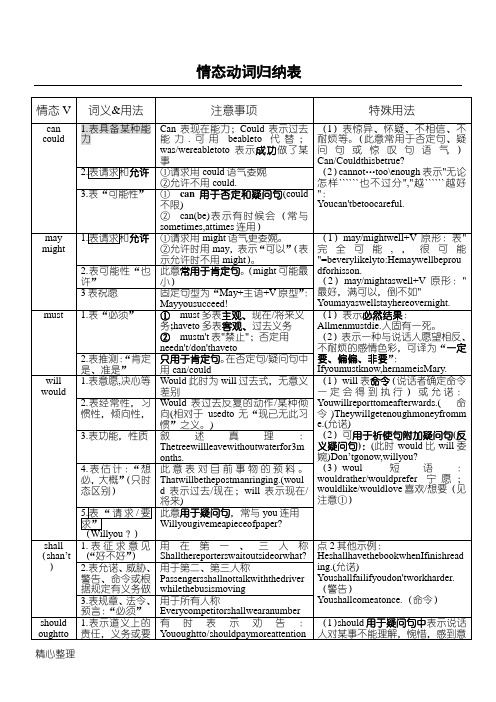
情态动词归纳表情态V词义&用法注意事项特殊用法can could 1.表具备某种能力Can表现在能力;Could表示过去能力.可用beableto代替;was/wereabletoto表示成功做了某事(1)表惊异、怀疑、不相信、不耐烦等。
(此意常用于否定句、疑问句或惊叹句语气)Can/Couldthisbetrue?(2)cannot…too\enough表示"无论怎样``````也不过分","越``````越好":Youcan'tbetoocareful.2.表请求和允许①请求用could语气委婉②允许不用could.3.表“可能性”①can用于否定和疑问句(could不限)②can(be)表示有时候会(常与sometimes,attimes连用)may might 1.表请求和允许①请求用might语气更委婉。
②允许时用may,表示“可以”(表示允许时不用might)。
(1)may/mightwell+V原形:表"完全可能,,很可能"=beverylikelyto:Hemaywellbeproudforhisson.(2)may/mightaswell+V原形:"最好,满可以,倒不如"Youmayaswellstayhereovernight.2.表可能性“也许”此意常用于肯定句。
(might可能最小)3表祝愿固定句型为“May+主语+V原型”:Mayyousucceed!must 1.表“必须”①must多表主观、现在/将来义务;haveto多表客观、过去义务②mustn't表"禁止";否定用needn't/don'thaveto (1)表示必然结果:Allmenmustdie.人固有一死。
(2)表示一种与说话人愿望相反、不耐烦的感情色彩,可译为“一定要、偏偏、非要”:Ifyoumustknow,hernameisMary.2.表推测:“肯定是、准是”只用于肯定句。
情态动词用法表格归纳
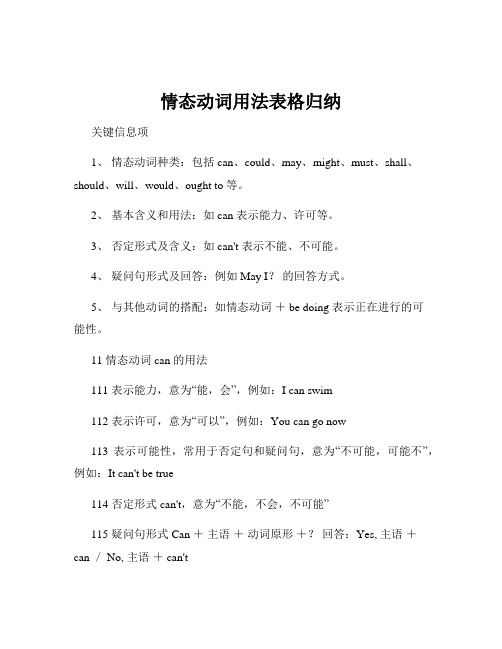
情态动词用法表格归纳关键信息项1、情态动词种类:包括 can、could、may、might、must、shall、should、will、would、ought to 等。
2、基本含义和用法:如 can 表示能力、许可等。
3、否定形式及含义:如 can't 表示不能、不可能。
4、疑问句形式及回答:例如 May I?的回答方式。
5、与其他动词的搭配:如情态动词+ be doing 表示正在进行的可能性。
11 情态动词 can 的用法111 表示能力,意为“能,会”,例如:I can swim112 表示许可,意为“可以”,例如:You can go now113 表示可能性,常用于否定句和疑问句,意为“不可能,可能不”,例如:It can't be true114 否定形式 can't,意为“不能,不会,不可能”115 疑问句形式 Can +主语+动词原形+?回答:Yes, 主语+can / No, 主语+ can't12 情态动词 could 的用法121 could 是 can 的过去式,用于过去时态,表示过去的能力、许可等,例如:He could play the piano when he was five122 could 可用于现在时,语气比 can 更委婉,例如:Could you help me?123 否定形式 couldn't,意为“不能,不会,不可能”124 疑问句形式 Could +主语+动词原形+?回答:Yes, 主语+could / No, 主语+ couldn't13 情态动词 may 的用法131 表示许可或请求许可,意为“可以”,例如:May I come in?132 表示可能性,意为“也许,可能”,例如:It may rain tomorrow 133 否定形式 may not,意为“可能不”134 疑问句形式 May +主语+动词原形+?回答:Yes, 主语+may / No, 主语+ mustn't14 情态动词 might 的用法141 might 是 may 的过去式,用于过去时态,表示过去的可能性、许可等,例如:He said that he might come142 might 可用于现在时,语气比 may 更委婉、不确定,例如:Might I have a word with you?143 否定形式 might not,意为“可能不”144 疑问句形式 Might +主语+动词原形+?回答:Yes, 主语+might / No, 主语+ might not15 情态动词 must 的用法151 表示必须,强调主观上的必要,例如:You must do your homework152 表示肯定的推测,意为“一定,准是”,例如:He must be at home153 否定形式 mustn't,意为“禁止,不许”154 疑问句形式 Must +主语+动词原形+?回答:Yes, 主语+must / No, 主语+ needn't16 情态动词 shall 的用法161 用于第一人称(I, we),表示征求对方的意见或建议,例如:Shall we go shopping?162 用于第一、三人称的疑问句,表示征求对方的意见或指示,例如:Shall he come in?163 用于第二、三人称,表示允诺、警告、命令、威胁等,例如:You shall fail if you don't work hard17 情态动词 should 的用法171 表示应该,常指义务或责任,例如:You should keep your promise172 表示推测,意为“按理应当,估计”,例如:They should be there by now173 否定形式 shouldn't,意为“不应该”174 疑问句形式 Should +主语+动词原形+?回答:Yes, 主语+ should / No, 主语+ shouldn't18 情态动词 will 的用法181 表示意愿、决心,例如:I will help you182 表示请求、建议,用于第二人称疑问句,例如:Will you please close the door?183 表示习惯性动作或客观事实,例如:Fish will die without water 184 否定形式 won't,意为“不愿意,不会”185 疑问句形式 Will +主语+动词原形+?回答:Yes, 主语+will / No, 主语+ won't19 情态动词 would 的用法191 would 是 will 的过去式,用于过去时态,表示过去的意愿、决心等,例如:He said he would come192 would 用于现在时,语气比 will 更委婉,例如:Would you like some coffee?193 否定形式 wouldn't,意为“不愿意,不会”194 疑问句形式 Would +主语+动词原形+?回答:Yes, 主语+ would / No, 主语+ wouldn't110 情态动词 ought to 的用法1101 表示应该,语气比 should 稍强,例如:You ought to obey the law1102 否定形式 ought not to,意为“不应该”1103 疑问句形式 Ought +主语+ to +动词原形+?回答:Yes, 主语+ ought / No, 主语+ oughtn't。
2023版人教高中英语必修一情态动词表
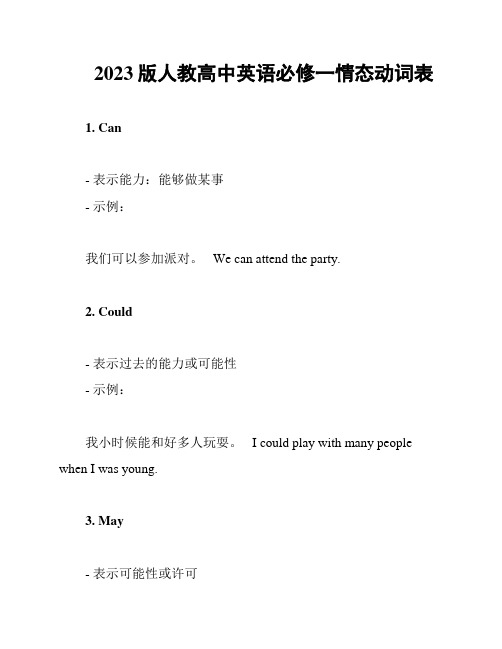
2023版人教高中英语必修一情态动词表1. Can- 表示能力:能够做某事- 示例:我们可以参加派对。
We can attend the party.2. Could- 表示过去的能力或可能性- 示例:我小时候能和好多人玩耍。
I could play with many people when I was young.3. May- 表示可能性或许可- 示例:4. Might- 表示微弱的可能性或许可- 示例:我们可以去公园玩,但也许会下雨。
We might go to the park, but it might rain.5. Must- 表示必须、肯定或推测- 示例:我们必须遵守学校的规定。
We must follow the school's regulations.6. Shall- 表示征求意见或提议- 示例:我们明天去游泳,好吗? Shall we go swimming tomorrow?7. Should- 表示应该、建议或责任- 示例:我们应该关心环境保护。
We should care about environmental protection.8. Will- 表示将来的动作、意图或意愿- 示例:我们明天会去购物。
We will go shopping tomorrow.9. Would- 表示愿意、过去的意愿或虚拟条件- 示例:如果我有时间,我会帮你。
If I had time, I would help you.10. Ought to- 表示应该、理应- 示例:你应该尽早开始学习。
You ought to start studying early.。
(完整版)人教版初中英语各单元情态动词知识点汇总表
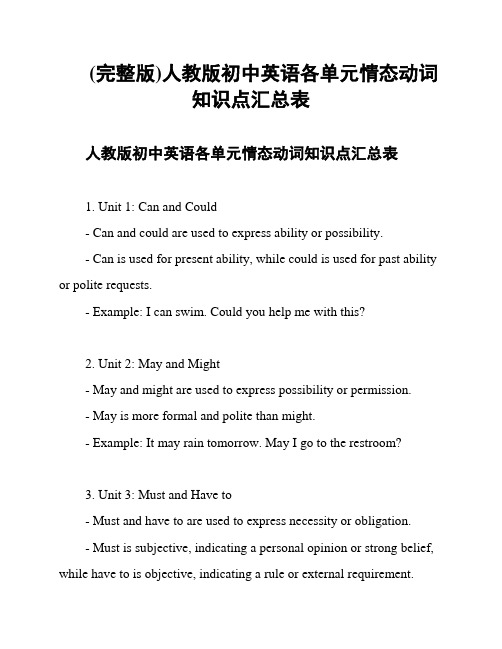
(完整版)人教版初中英语各单元情态动词知识点汇总表人教版初中英语各单元情态动词知识点汇总表1. Unit 1: Can and Could- Can and could are used to express ability or possibility.- Can is used for present ability, while could is used for past ability or polite requests.- Example: I can swim. Could you help me with this?2. Unit 2: May and Might- May and might are used to express possibility or permission.- May is more formal and polite than might.- Example: It may rain tomorrow. May I go to the restroom?3. Unit 3: Must and Have to- Must and have to are used to express necessity or obligation.- Must is subjective, indicating a personal opinion or strong belief, while have to is objective, indicating a rule or external requirement.- Example: I must study for the exam. We have to wear uniforms.4. Unit 4: Should and Ought to- Example: You should visit the doctor. He ought to apologize.5. Unit 5: Need and Needn't- Need and needn't are used to express necessity or lack of necessity.- Need is used in positive sentences, while needn't is used in negative sentences or questions.- Example: You need to finish your homework. You needn't worry about it.6. Unit 6: Shall and Will- Shall and will are used to make offers, suggestions, or predictions.- Shall is used with "I" and "we" to make suggestions or ask for advice, while will is used with all pronouns and subjects to express future actions or intentions.- Example: Shall we go for a walk? I will help you with your project.7. Unit 7: Would and Should- Would and should are used to express hypothetical situations, requests, or polite offers.- Would is the past tense of will and is used to talk about unreal or unlikely situations.- Should is used to give advice or express expectations.- Example: If I had money, I would buy a new car. You should apologize to her.8. Unit 8: Can/Could/Will/Would you please...- Can/Could/Will/Would you please... is used to make polite requests or ask for help.- Example: Can you please lend me your pen? Could you please open the window?以上是人教版初中英语各单元情态动词知识点汇总表。
- 1、下载文档前请自行甄别文档内容的完整性,平台不提供额外的编辑、内容补充、找答案等附加服务。
- 2、"仅部分预览"的文档,不可在线预览部分如存在完整性等问题,可反馈申请退款(可完整预览的文档不适用该条件!)。
- 3、如文档侵犯您的权益,请联系客服反馈,我们会尽快为您处理(人工客服工作时间:9:00-18:30)。
不得不
Ican’tseethingsclearly,Ihavetowearglasses.
情态动词+havedone
1.musthavedone
对过去的肯定推测(只能用于肯定句)译为“过去肯定…”
Shemusthaveearnedmuchmoney,forheboughtanexpensivecarlastweek.
NeedIcomebacklate?No,youneedn’t/don’thaveto.
针对不同时间表示推测(只能用于肯定句)
mustdo
Tommuststudyhard,forhealwaysgetsthefirstplaceeverytime.
mustbedoing
It’ssonoisyupstairs.Theymustbequarrelingagain.
musthavedone
Itmusthavebeenaround9:00,becauseitwastotallydark.
6.shall
一三人称的问句表示请求
Shallhewaithere?
Whatshallwedonext?
二三人称的陈述句表示允诺,警告,命令,威胁…
Youshallgetananswertomorrow.
8.will
表示意愿
Tomisillathome.Iwillseeafterschool.
表示请求
Willyoupleaseopenthedoorforme?
习惯性动作,指现在
Accidentwillhappen.
9.would
表示意愿
Hesaidhewouldgivemeagift.
表示请求
Wouldyoupleasecleanupthemessyroom?
2.cannothavedone
对过去的否定推测(只能用于否定句)译为“过去肯定没有…”
Hecan’thavegonefar,forhiscoatisstillhere.
canhavedone
还可用于问句表示对过去的推测
Wherecanhehaveputthebag?
3.may/mightnothavedone
针对不同时间表示推测(只能用于否定句和问句)
can’tdo
Hecan’tbeathomerightnow,forIsawhimgooutjustnow.
can’tbedoing
Hecan’tbestudyingintheclassroom,forIsawhimgotothefootballfieldwithafootball.
表示对已经发生的事进行推测,可能性不大
Ican’tfindpurseanywhere.Youmayhavedroppeditwhenyouwereshoppinginthemarket.
4.should/oughttohavedone
过去该做而没有做
Youshouldhavecometoschoolifyouwerereallyseriousaboutyourstudy.
needdoing是主动表示被动=needtБайду номын сангаасbedone
Themachineneedsrepairing.=Themachineneedstoberepaired.
11.oughtto
应该
否定形式:oughtn’t/oughtnotto
Yououghttomakeanapologytohim.
Heoughtn’tattendthemeeting.
Youmusthaveapassportifyouwanttogoabroad.
Youmustn’ttakephotoshere!
回答must/need的一般疑问句时,肯定回答用must;否定回答用needn’t/don’thaveto
MustIcomebackhomeearly?Yes,youmust.
7.should
劝告,建议
Youshouldseeyourparentsregularly.
根据客观事实作出的的判断,可能性较大
It’s7:20.Heshouldcome.
why/how+should表示说话人对某事不能理解,感到意外,译为“竟会”
Whyshouldyoubesolatetoday?
can’thavedone
Hecan’thavefinishedhomeworksosoon,forhedidn’tcometoschoolyesterday.
WherecanIhaveputmykeys?
3.
4.may/might
允许
MayIsmokehere?
表示祝愿
Mayyouahappylife!
1.
2.can/could
能力
HecansingsongsinFrench.
Hecouldswimattheageof3.
表示请求
Canyouhelpmecarrytheboxintotheroom?
Couldyouhelpme,please?
可能性,表示有时会
Jeffisclever,butsometimesheisverydull.
5.shouldnot/oughtnottohavedone
做了不该做的事(过去)
Weoughtn’ttohavegivenhimsomuchmoney.
6.couldhavedone
过去本来可以做某事,但没有做
HecouldhavevisitedtheGreatWallbutitsuddenlybegantorainyesterday.
针对不同时间表示推测(只能用于否定句和问句)
maydo
Hemaycome,butheisnotsure.
maybedoing
Jimmaybereadinginthelibrary.
mayhavedone
Hemayhaveleftthebaginthelibrary.
5.must
肯定形式表示必须,应该;否定形式表示绝对禁止,语气强烈
习惯性动作,指过去
Wewouldsitaroundgrandpa,listeningtohisstory.
10.need/dare半情态动词
作情态动词时常用于否定和问句中;作实意动词时常用于肯定句
NeedItellhimall?Youneedn’ttellus.
Hedarestoanswerquestionsloudlyinfrontofus.
